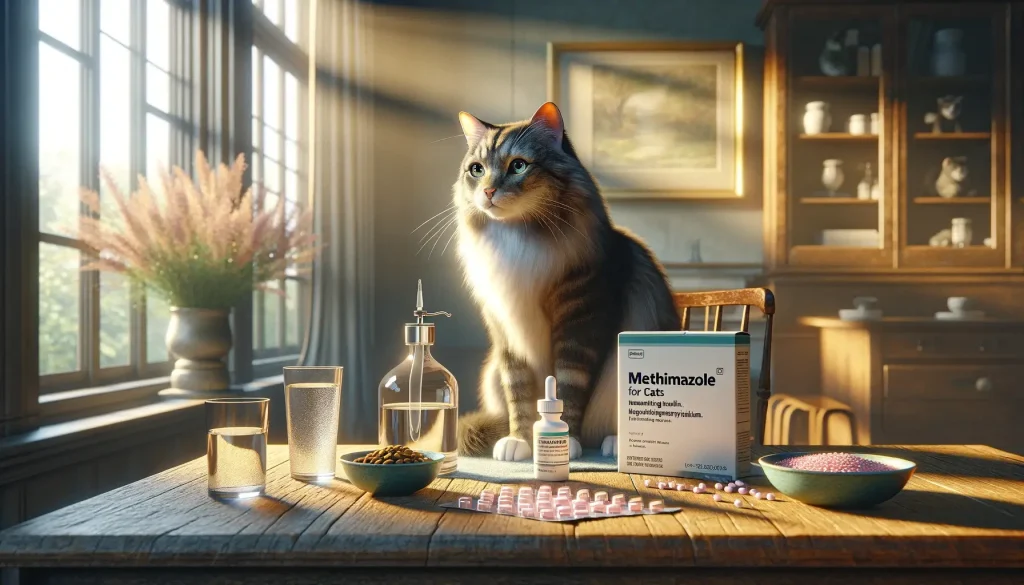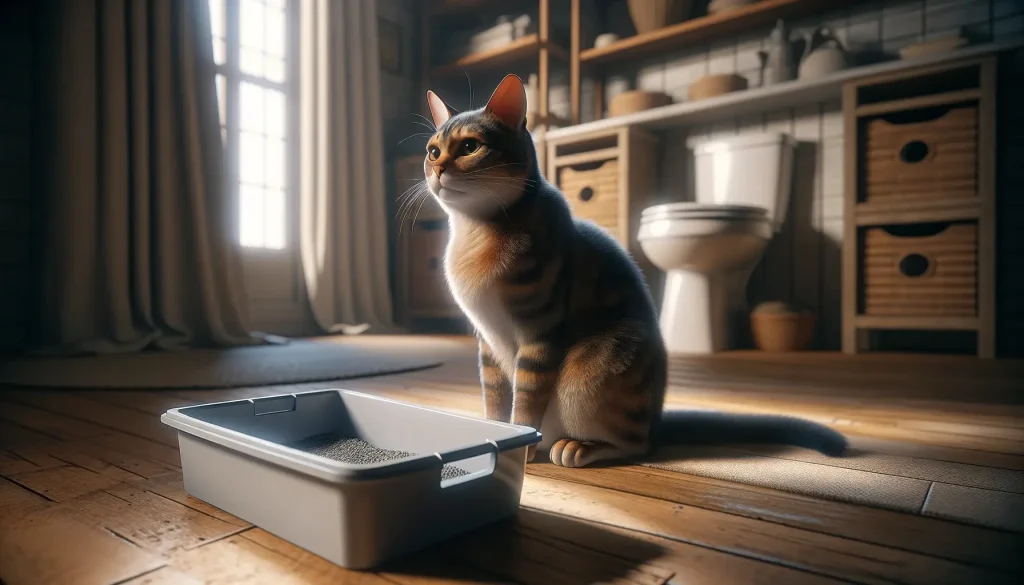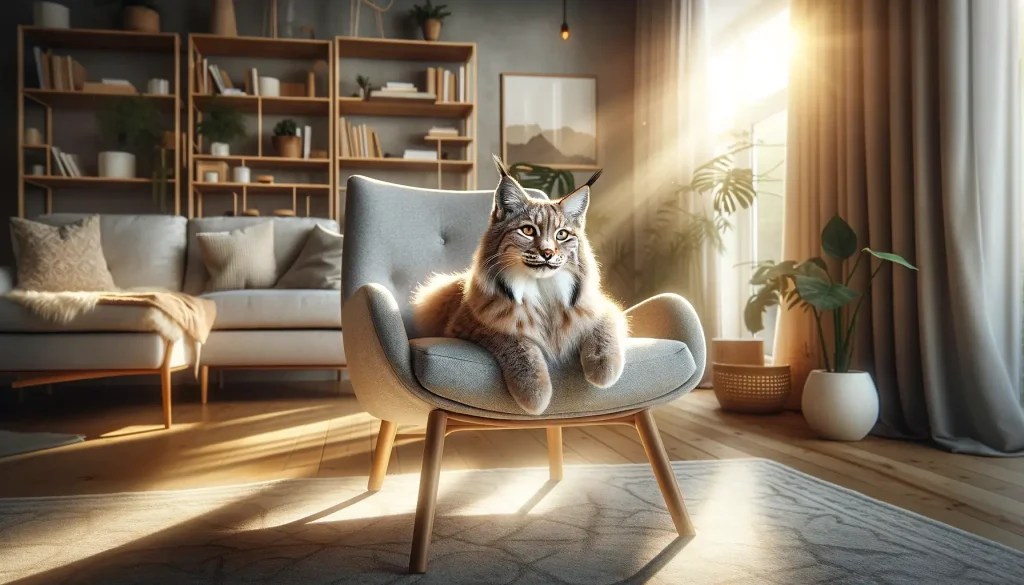
Highland Lynx Cats: Your Ultimate Pet
Welcome prospective pet owners and cat enthusiasts alike! Today, we dive into the world of Highland Lynx cats, a unique and captivating breed that has captured the hearts of many. Despite being a relatively new player in the realm of feline breeds, their standout features and friendly nature have made them a popular choice among cat lovers.
What exactly is a Highland Lynx cat? This breed is an extraordinary mix of domestic breeds, characterized by their resemblance to big, wild cats while retaining a gentle and companionable nature. The breed’s journey began in 1993, thanks to the efforts of cat breeder Joe Childers. The aim was clear: to create a breed that not only looked majestic but also fit well into the domestic setting. By crossing the Desert Lynx with the Jungle Curl cat breeds, the Highland Lynx was born.
Although initially thought to contain wild cat genes, it was soon established that these assertions were incorrect, leading to a more widespread acceptance of the name Highlander, or occasionally Highlander Shorthair. One of the breed’s most appealing traits is its personality. Known for their sociability, Highland Lynx cats are great companions for children and get along well with other pets. However, their high energy levels mean they thrive on regular play and exercise.
When it comes to grooming and care, Highland Lynx cats are generally low maintenance, requiring minimal grooming due to their typically short coat. Nonetheless, owners should be attuned to their pet’s health, as they are prone to certain health issues inherited from their lineage—the Desert Lynx and Jungle Curl.
Before adopting a Highland Lynx, it’s essential to understand what makes them unique. From their love of water to the potential for polydactyl paws and their remarkable ability to learn tricks, these cats bring a lot of joy and a little bit of challenge into a pet owner’s life. For those considering a Highland Lynx as their next pet, you’re in for a delightful and engaging companionship.
Choosing the right name for your Highland Lynx can also be a fun process. With literary inspirations like Ichabod, Finn, Darcy, and Scarlett, you can find a name that suits your new pet’s personality and your personal tastes.
Whether you’re drawn to their friendly demeanor, their interesting background, or their unique attributes, Highland Lynx cats are sure to make a wonderful addition to your family. Let’s explore what makes them such a special breed.
Highland Lynx Cats: Your FAQs Answered
There’s a lot to know about the Highland Lynx cats. This section aims to address the most common questions to help you understand these magnificent creatures better. Let’s get started.
What is a Highland Lynx cat?
A Highland Lynx cat is a mix of domestic breeds, known for resembling bigger, wilder cats while maintaining a friendly and domesticated nature. Created by Joe Childers in 1993, they stemmed from crossing the Desert Lynx and Jungle Curl cat breeds.
Are Highland Lynx cats good with children and other pets?
Yes, Highland Lynx cats are known for their sociable nature making them great pets for families with children and other pets. They usually enjoy playing and should be introduced carefully to ensure harmony in the household.
Do Highland Lynx cats require a lot of grooming?
Not particularly. Most have a short coat requiring minimal grooming, usually just a weekly brushing. However, those with longer coats might need more frequent grooming to avoid matting and hairballs.
What health issues should I watch out for in a Highland Lynx cat?
While generally healthy, Highland Lynx cats may inherit health issues from their parent breeds, such as ear infections or urinary tract infections. Regular check-ups and being attentive to their health can help manage these risks.
How big do Highland Lynx cats get?
Females usually weigh between 10-14 pounds, while males can weigh between 15-20 pounds. Remember, individual cats may differ in size.
Do Highland Lynx cats like water?
Unlike many felines, Highland Lynx cats typically enjoy water and might even play in it. They defy the common cat stereotype of hating water, making bath time potentially more enjoyable.
Can Highland Lynx cats have extra toes?
Yes, some Highland Lynx cats are polydactyl, meaning they have more than the usual number of toes. This unique trait adds to their distinctive appearance.
Are there any recommended names for Highland Lynx cats?
Choosing a name can be fun. For inspiration, consider literary names like Ichabod, Argos, Finn, Darcy, Scarlett, Bilbo, Princess Buttercup, Percy, Atticus, or Cosette.
This FAQ aims to cover the basics about Highland Lynx cats, but there’s always more to learn about these fascinating pets. If you’re considering making one a part of your family, they promise to bring joy, entertainment, and a bit of wild beauty into your home.
Highland Lynx Cat Facts: What Makes Them Stand Out
If you’re considering adding a Highland Lynx cat to your family, knowing about their distinct characteristics is a good start. This breed stands out not just for its striking looks but also for its engaging personality and behavior. Let’s explore some compelling facts about these mesmerizing felines.
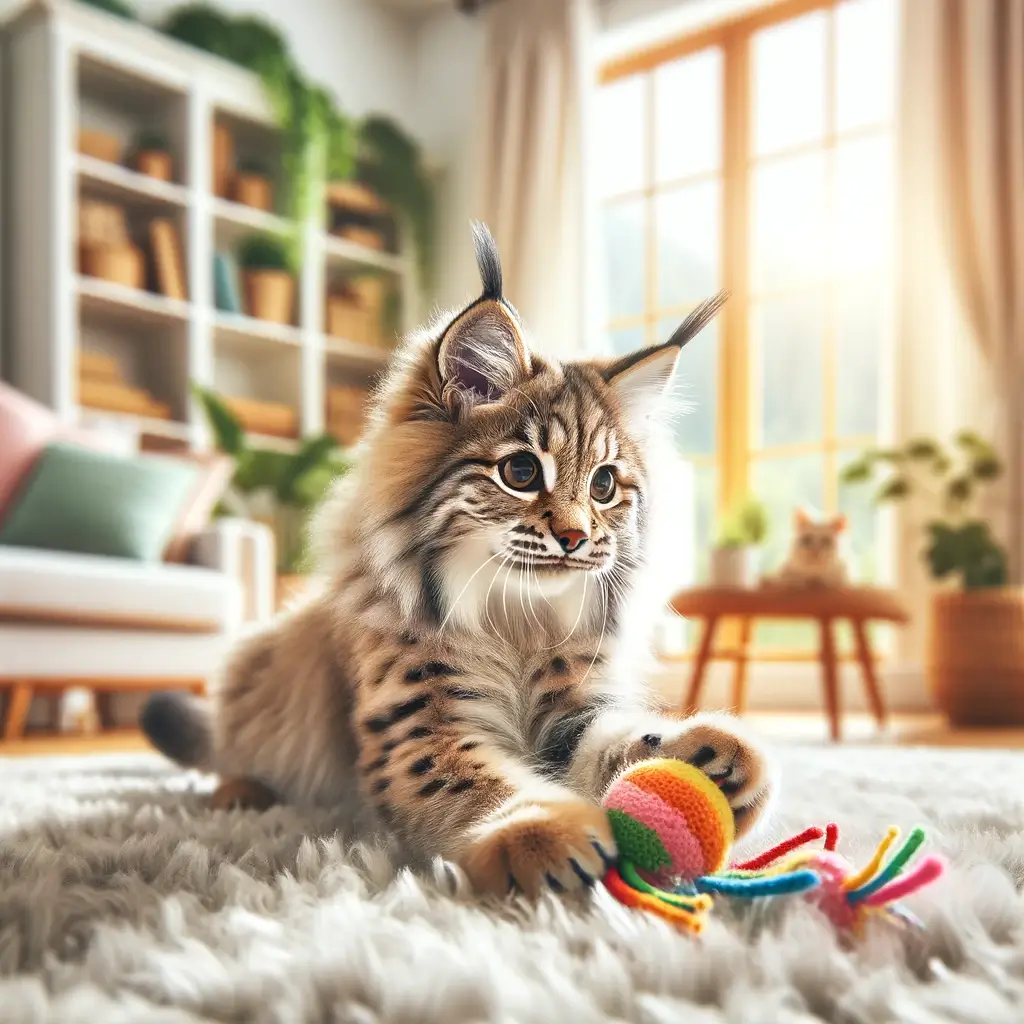
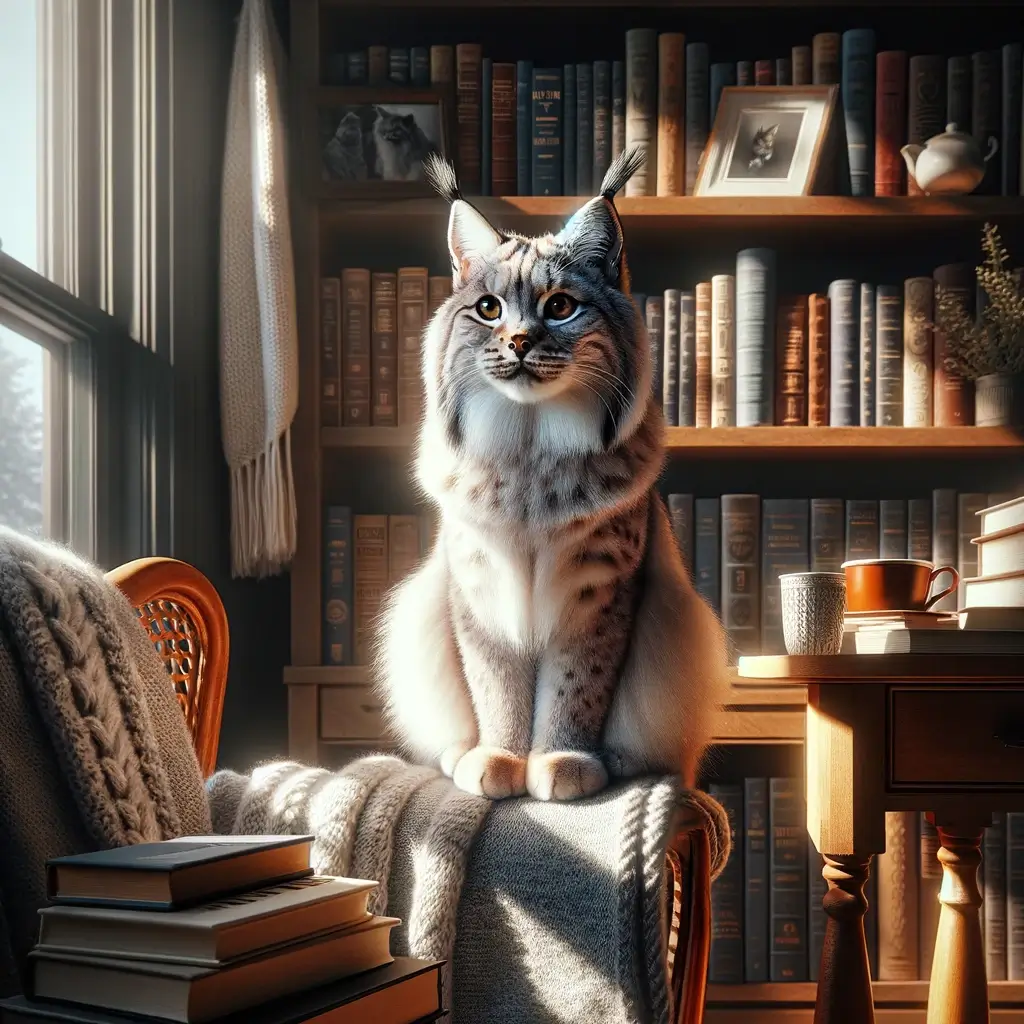
Breed History and Attributes
The Highland Lynx was developed in 1993 by breeder Joe Childers. His goal? To blend the wild look of lynxes with the demeanor of domestic cats. Through combining the Desert Lynx and Jungle Curl cat breeds, the Highland Lynx came into existence. Despite early misconceptions, this breed does not have wild cat genes. Today, they’re often referred to as Highlanders, highlighting their domestic breed status.
As pets, Highland Lynx cats are excellent companions. They’re notably sociable, getting along famously with children and other pets. Early, supervised introductions help ensure a smooth integration into the home. With a zest for life, these cats possess a high energy level, thriving on daily play and mental stimulation. Puzzle games and interactive toys are perfect for keeping them entertained.
Their grooming needs are somewhat low. Most Highland Lynx cats will do fine with weekly brushing unless they have a longer coat, which might require more frequent care. Regular dental care and ear cleaning, as well as periodic nail trims, contribute to their overall well-being.
Common Health Issues
Though largely healthy, Highland Lynx cats can be predisposed to certain conditions inherited from their parent breeds. Owners should be vigilant against ear infections, Horner’s syndrome, hematuria, constipation, and urinary tract infections. Regular vet check-ups can help catch any issues early.
Size and Fun Facts
Adult Highland Lynx cats typically weigh between 10 and 20 pounds, with females at the lower end of this range and males at the higher. But personality is where they truly stand out. Unlike many cats, Highland Lynx often enjoy water and can be seen playing in it. Their potential for polydactyl paws adds to their unique appeal. These cats are also quite trainable, capable of learning tricks and even playing fetch, challenging the typical cat stereotype.
Choosing a Name for Your Highland Lynx
Selecting the perfect name for your Highland Lynx can be a fun process. Literary names offer a wealth of inspiration. Consider Ichabod, Argos, Finn, Darcy, Scarlett, Bilbo, Princess Buttercup, Percy, Atticus, or Cosette for a name as distinctive as your cat.
Highland Lynx cats are more than just pets; they’re companions with a wild look and loving hearts. Whether it’s their friendly disposition, low-maintenance grooming needs, or health diligence, each factor contributes to making them fascinating family members. Knowing these details, you’re one step closer to understanding if a Highland Lynx is the right pet for you.
Highland Lynx Cats: Fun Facts to Know
What sets Highland Lynx cats apart from the average house cat? A lot, as it turns out. This breed is full of surprises, from their fascinating origin to their quirky traits. Let’s dive into some fun facts that highlight why these felines are so unique.
| Fact | Detail |
|---|---|
| Water Love | Unlike most cats, Highland Lynx often enjoy water and may seek it out for play. |
| Polydactyl Paws | Some Highland Lynx cats have more than the usual number of toes, making them polydactyl. |
| Trick Learners | These cats can learn various tricks and even how to play fetch, showcasing their intelligence and trainability. |
| Love for Exercise | High energy levels make Highland Lynx require daily exercise, playtime, and mental stimulation. |
| Grooming Needs | Mostly low maintenance, their short coat needs brushing once a week, though long-coated Highland Lynx may require daily care. |
| Health Watch | Prone to certain health issues like ear infections and urinary tract infections, making veterinary check-ups essential. |
In addition to the above, the weight of Highland Lynx cats can vary, with females usually between 10-14 pounds and males ranging from 15-20 pounds. But remember, each cat is unique and may not fit these exact specifications.
When it comes to naming your Highland Lynx, literary inspirations can offer a treasure trove of options. Names like Ichabod, Argos, Finn, Darcy, Scarlett, Bilbo, Princess Buttercup, Percy, Atticus, or Cosette could be a perfect match for your pet’s personality and your own literary tastes.
Discovering these fun facts about Highland Lynx cats enriches the understanding and appreciation for this remarkable breed. Whether it’s their love for water, unique physical traits like polydactyl paws, or their capacity for learning tricks, there’s always something new and engaging to learn about these captivating companions.
Fur Facts: Highland Lynx Coat Care and Allergies
Highland Lynx cats might have a low-maintenance coat, but that doesn’t mean they’re care-free. Their short fur requires minimal grooming, typically a weekly brushing. However, for those Highland Lynx with a longer coat, daily grooming is essential to prevent tangles and hairballs. This grooming routine not only keeps their coat in good condition but also strengthens the bond between pet and owner.
Despite their easy-going grooming needs, it’s important to note that Highland Lynx allergies can still pose a problem for sensitive individuals. Regular grooming can help minimize the spread of dander, but it’s crucial for potential owners with allergies to spend time around the breed before making a commitment.
Dental care is another aspect of grooming that shouldn’t be overlooked. Brushing your cat’s teeth a few times a week with cat-safe toothpaste can prevent dental issues and contribute to their overall health. Additionally, regular ear checks and cleanings can ward off infections, ensuring your Highland Lynx remains happy and healthy.
Don’t forget about claw care. Regular nail trims are necessary, and providing various scratching posts can help your Highland Lynx naturally keep their nails in check. This not only prevents overgrowth and splitting but also satisfies their natural scratching instincts.
Understanding these grooming and care requirements is essential for any prospective Highland Lynx owner. It’s not just about keeping them looking good; it’s about maintaining their health and happiness too.
Caring for Your Highland Lynx: Essential Tips
Bringing a Highland Lynx cat into your home is exciting. However, it’s vital to understand their care requirements fully. From grooming to health monitoring, here’s how to keep your Highland Lynx in top shape.
Grooming Your Highland Lynx
Grooming a Highland Lynx is straightforward. Their short coat needs little attention, with weekly brushing generally sufficient. Yet, for those with longer fur, daily brushing is essential to avoid mats and hairballs. This not only keeps their coat clean but also reduces the spread of dander, which can trigger allergies.
Don’t overlook dental hygiene. Brush your cat’s teeth regularly with feline-friendly toothpaste to prevent dental issues. Ears should be checked and cleaned to avoid infections. Remember, well-kept nails are also important. Trim them regularly and provide scratch posts to maintain their length and health.
Health Considerations
The Highland Lynx is generally healthy but watch for ear infections, Horner’s syndrome, hematuria, constipation, and urinary tract infections. Regular vet visits can detect and treat these conditions early, ensuring a longer, happier life for your pet.
Remember, each cat is unique. While most Highland Lynx are energetic and love water, individual preferences may vary. Knowing your pet’s likes and dislikes is key to a happy relationship.
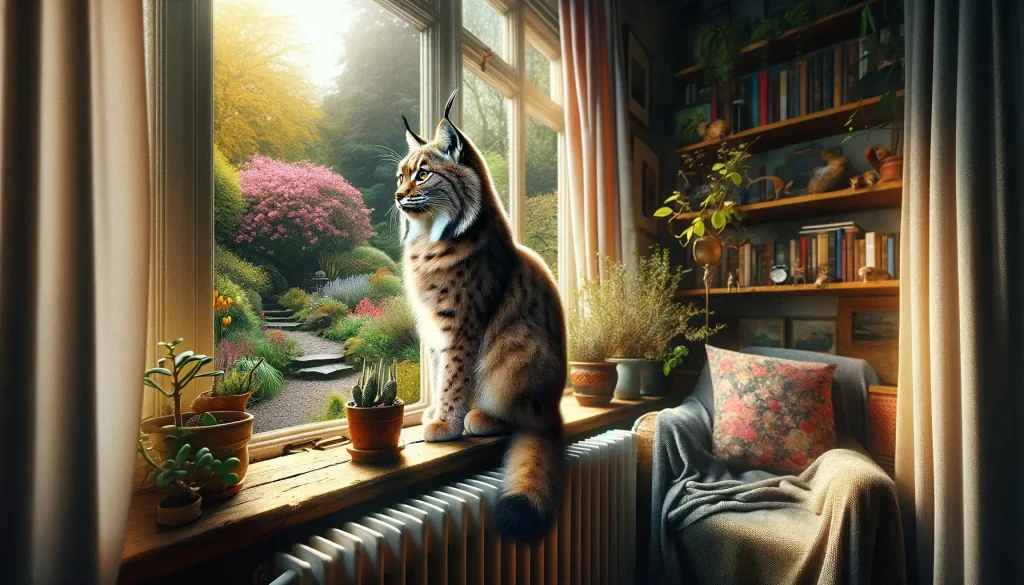
Fascinating Characteristics of Highland Lynx
Highland Lynx cats are not typical pets. They have unique traits that set them apart. For instance, their comfort with water is uncommon among cats. Some enjoy playing in it, showing their playful and quirky nature.
Additionally, polydactyl paws occur in some Highland Lynx, giving them an extra toe or two. This not only adds to their distinctive look but can also be an advantage in their dexterity.
Highland Lynx cats are also highly trainable. They can learn tricks and even play fetch, making them fun and interactive companions.
Exercise and Play
High energy levels in Highland Lynx cats require daily exercise and mental stimulation. Toys, cat towers, and companionship play a crucial role in keeping them entertained and healthy. Puzzle and brain games can also provide necessary mental stimulation, keeping their sharp minds engaged.
Naming Your Highland Lynx
Choosing a name for your Highland Lynx can be a fun part of the pet-parent journey. Names inspired by literature, such as Ichabod, Argos, Finn, Darcy, Scarlett, Bilbo, Princess Buttercup, Percy, Atticus, and Cosette, can be perfect for a breed as unique as the Highland Lynx. Each name carries a story, much like your new feline friend will bring into your life.
In essence, understanding and catering to the needs of your Highland Lynx will lead to a fulfilling and joyful companionship. Embracing their unique needs and characteristics ensures a loving home suited for this exceptional breed.
Fascinating Companion: Understanding Highland Lynx Behavior and Social Needs
The behavior and social needs of Highland Lynx cats are as unique as their striking appearance. Understanding these aspects is crucial for fostering a nurturing environment that allows your pet to thrive. Let’s explore what makes these felines tick.
Behavior Traits of Highland Lynx Cats
Highland Lynx cats are known for their energetic and playful nature. Unlike some more sedentary breeds, Highland Lynx need daily playtime and physical activity to stay happy and healthy. Engaging in interactive play with your cat can strengthen your bond and keep them mentally stimulated.
They are also characterized by their intelligence and trainability. Many Highland Lynx owners find joy in teaching their cats tricks and playing fetch. This not only provides stimulation but also satisfies the cat’s need for interaction.
Social Needs and Family Integration
Highland Lynx cats thrive in family settings. They are sociable creatures that enjoy the company of humans and other pets alike. However, proper introductions are key. Slowly introducing a Highland Lynx to new pets and family members can prevent stress and ensure a smooth transition.
For families with children, teaching kids how to interact safely and respectfully with pets is vital. Encouraging gentle play and supervision helps build a positive relationship between your child and your Highland Lynx.
Creating a Stimulating Environment
To meet their high energy levels, creating a stimulating environment is essential for a Highland Lynx. This can include:
- Providing various toys that encourage chasing, pouncing, and hunting behaviors.
- Setting up cat towers or trees that allow them to climb and explore.
- Incorporating puzzle or brain games to challenge their intelligence.
- Offering safe outdoor playtime in an enclosed area or supervised walks with a harness.
It’s also worth noting that some Highland Lynx might show a unique interest in water, whether it’s playing with water from a faucet or even taking short dips. Observing and fostering these unique interests can provide additional ways to enrich their daily lives.
Health Monitoring and Prevention
While Highland Lynx cats are generally healthy, their playful nature and curiosity can sometimes lead to minor injuries or the need for health checks. Keeping a close eye on their behavior and physical condition can help catch any potential issues early. Regular veterinary check-ups, vaccinations, and preventative care are all part of keeping your Highland Lynx healthy.
Understanding the behavior and social needs of your Highland Lynx is a crucial part of pet ownership. These aspects directly influence how your cat integrates into your family and how you can best provide for their care. With the right approach, you’ll enjoy a rewarding companionship filled with love, activity, and mutual respect.
Beginner Guide to Raising Quail at Home
What are the Signs of a Dog Concussion?
What Causes Your Dog’s Ears to Smell Bad?
When your dog’s ears start to emit an unpleasant odor, it might leave you puzzled…
Methimazole Treatment for Cat Hyperthyroidism
Methimazole plays a crucial role in managing feline hyperthyroidism, a condition marked by an overactive…
Got Hummingbirds in your Backyard? Here’s How to Care for Them.
Why Does Your Cat Pee Outside the Litter Box?
Cat’s Litter Box Issues It’s not uncommon for cat owners to face the frustrating dilemma…



